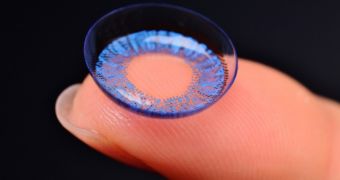There is a very specific category of people who might want to pay close attention to this piece of news, and this category includes all the folks in the world who, for one reason or another, wear contact lenses.
Thus, the news is about a young woman in Taiwan who is now blind because of a simple but otherwise dreadful mistake: wearing her contact lenses for one too many days in a row without bothering to clean them.
The woman in question is 23-year-old Lian Kao, an undergraduate student at a university in Taiwan. Apparently, her rather hectic schedule is to blame for her forgetting to remove her contact lenses on a regular basis.
According to Daily Mail, this woman went about 6 months in a row without removing her lenses and giving them a good scrub before figuring out that something was seriously off and asking for help from doctors.
During this time, the 23-year-old not only attended classes and studied, but also went swimming several times. By the looks of it, the undergraduate student did not even remove her contact lenses when taking a bath.
By the time Lian Kao presented for a consult, it was already too late for doctors to even try and save her sight. Thus, when removing the woman's contact lenses, specialists were shocked to discover her eyeballs had been eaten by a bug.
Information shared with the public says that the bug that cost this 23-year-old student her eyesight was an amoeba that the woman most likely picked up while swimming and that thrived in the space between her eyeballs and the lenses.
In an interview, specialist Wu Jian-liang, director of ophthalmology at Taipei's Wan Fang Hospital, explains that, unfortunately, this woman asked for help much too late. Hence, he and his colleagues were simply unable to repair her eyes.
“A shortage of oxygen can destroy the surface of the epithelial tissue, creating tiny wounds into which the bacteria can easily infect, spreading to the rest of the eye and providing a perfect breeding ground,” Wu Jiang-liang says.
“The girl should have thrown the contact lenses away after a month but instead she overused them and has now permanently damaged her corneas,” the ophthalmology specialist goes on to explain.
The doctors who saw this case through can only hope that this 23-year-old's experience will help educate others about the dangers associated with wearing contact lenses. As Wu Jiang-liang put it, “Contact lens wearers are a high-risk group that can easily be exposed to eye diseases.”

 14 DAY TRIAL //
14 DAY TRIAL //